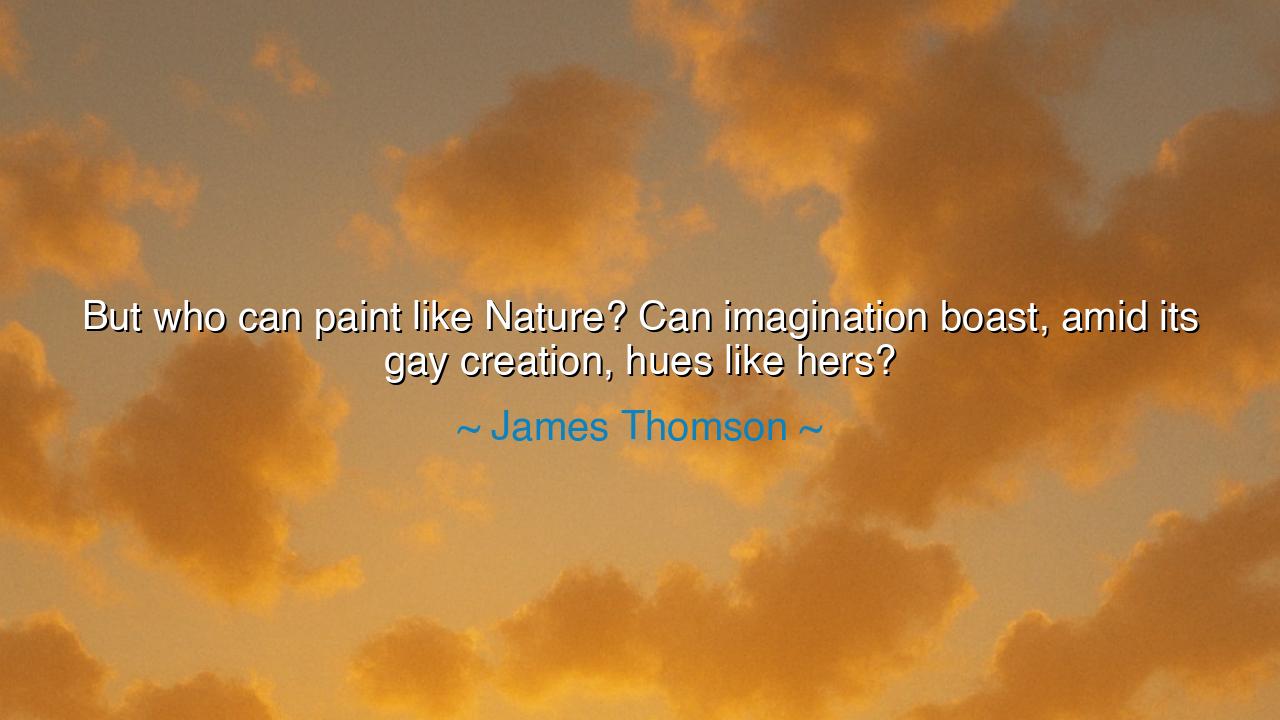
But who can paint like Nature? Can imagination boast, amid its
But who can paint like Nature? Can imagination boast, amid its gay creation, hues like hers?






The Painter of Eternity: The Power of Nature Beyond Imagination
Hear now, O seeker of truth and beauty, the words of James Thomson, poet of the dawn and chronicler of the seasons: “But who can paint like Nature? Can imagination boast, amid its gay creation, hues like hers?” In these lines, spoken with awe and reverence, lies an eternal question — whether the imagination of man, vast though it may be, can ever rival the majesty of Nature, the first and greatest artist. Thomson’s voice, rising from the heart of the eighteenth century, echoes like a hymn to the living world. It is both a tribute and a humbling confession — that all our dreams, our colors, our inventions, are but reflections of the boundless artistry of the earth itself.
Thomson wrote these words in his great work The Seasons, where he sought to capture through verse the changing moods of the world — the awakening of Spring, the fullness of Summer, the fading glory of Autumn, and the silent majesty of Winter. In describing them, he found himself in awe, for even the poet — wielder of the imagination — must bow before the perfection of creation. What brush can mimic the sky at sunrise? What artist can reproduce the shifting green of a leaf or the endless blue of the sea? Thus Thomson, though master of words, admits a truth that transcends all human craft: that Nature is the divine painter, and all our artistry is but an echo of her hand.
To understand his meaning, we must recall that the poets of his time stood at the threshold between the classical and the natural. The world was turning from reason to wonder, from the mechanical to the living. Thomson was among the first to see that the true teacher of beauty was not found in marble halls, but in the quiet fields, the wind, and the rain. In gazing upon the world, he saw divinity at work — a creative force beyond the reach of even the most daring imagination. This humility is not defeat, but reverence. For to stand in awe of the natural world is to remember one’s place in the order of things — a child before the infinite.
Yet the poet does not condemn imagination; he sanctifies it. For though imagination cannot outshine Nature, it is born of her. It is the flame she lights within us so that we may see her more deeply. The child who marvels at clouds forming dragons in the sky is not defying nature — he is joining her in her play. The artist who paints the sea does not challenge its beauty — he translates its rhythm into another form. Imagination is Nature’s mirror, her echo in the human heart. The one who imagines is the one who listens deeply to the earth’s silent song and gives it voice.
Consider the story of John Muir, the wanderer of the American wilderness. He ventured alone into the Sierra Nevada, not to conquer but to behold. When others saw only mountains, he saw cathedrals of creation; when they saw forests, he saw living temples. His journals are filled not with domination but devotion. “Nature’s peace,” he wrote, “will flow into you as sunshine flows into trees.” Like Thomson, he recognized that the imagination, though powerful, must kneel before the grandeur of the natural world. It is in humility, not pride, that imagination becomes most divine.
And yet, there is a deeper wisdom in Thomson’s question: “Can imagination boast?” He warns us against arrogance — against believing that the world exists to serve our visions rather than to inspire them. In our age of machines and endless creation, mankind too often forgets the source of his power. We build cities that blot out the stars, we invent wonders that drown out the voice of the sea — and in doing so, we lose touch with the very muse that gave us our imagination. To boast is to forget; to remember is to revere. The one who honors Nature will never cease to create, but will create in harmony, not in conquest.
So, O listener of the living earth, take this lesson into your heart: let your imagination be bold, but let it be rooted in reverence. Walk outside and behold the world not as background, but as masterpiece. Learn from the color of the dawn, the patience of the river, the silence of the stone. Before you paint, listen; before you write, observe; before you dream, remember that your dreams are born of the same soil that feeds the trees. The greatest creator is the one who honors the creation that came before.
And thus, as James Thomson reminds us, no hand can paint like Nature, for she is both artist and canvas, both mother and muse. Yet to stand in wonder of her work is to be made greater by it — to feel the eternal breath that moves through every leaf and every heart that dares to imagine. For though the human brush cannot rival hers, it can worship her in color, word, and song — and in that reverence, we become co-creators in the grand design of life itself.






AAdministratorAdministrator
Welcome, honored guests. Please leave a comment, we will respond soon